#regional passport officer
Text
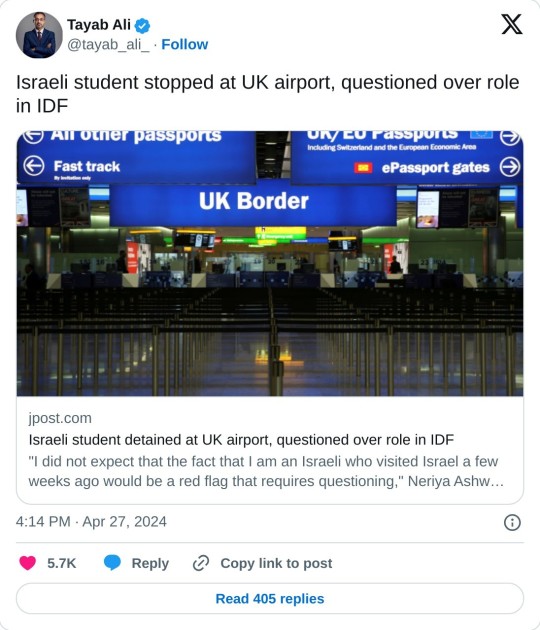
"I did not expect that the fact that I am an Israeli who visited Israel a few weeks ago would be a red flag that requires questioning," Neriya Ashwal told Walla.
Israeli student Neriya Ashwal landed at an airport near Nottingham last Friday and was detained for questioning by the anti-terrorism unit, according to Walla.
Neriya is an Israeli student studying in Barcelona. Last weekend, he had an unpleasant experience when he went on a short visit to Britain for a few days, landing at the small East Midlands airport outside Nottingham on Friday.
During questioning at the border control, he was asked if he had recently visited Israel, and he answered yes. He was then forced to undergo a more in-depth questioning by no less than the anti-terrorism unit.
After the border control officer asked the usual series of questions, Neriya was asked if he had recently visited Israel.
"I answered yes and said I had visited family and friends three weeks ago. The border control officer called someone on the phone and reported that they had an Israeli who had visited Israel recently," Neriya told Walla in a phone call from Barcelona. "He nodded, hung up, and asked me to sit and wait on the side. The passport remained with him.
"He continued, "After about a quarter of an hour, three uniformed police officers arrived, talked to each other, looked in my direction, and after another five minutes, two more people in civilian clothes arrived and escorted me to an interrogation room.
"The most senior of them told me, 'We are from the anti-terrorism unit. You have nothing to worry about. You are not detained. We just want to have a short conversation. You may go if you choose, but if you choose to go, we will detain you.'
"They started by asking the usual questions again: Who am I? Where did I come from? Why did I come? Where do I plan to stay? What exactly do I plan to do? But then it took a left turn.
"They started asking, 'Were you in the army?' Were you a combat soldier? 'I told them that I had diabetes and that I was not a fighter but in intelligence."
They continued: 'Were you in the field?' I answered no, while it seemed to me that I already understood what they were looking to hear and what they weren't. They continued with questions about the visit, 'When you were in Israel, did you have any role in the army?' I answered 'no' to that as well."
Neriya says that at the end of the questioning, they asked for proof of all his plans for the weekend, a return flight ticket, booking a place to stay, and a bus ticket to London.
"They tried to be nice, and when the most senior of them left the room, the junior said to me: 'We don't have a problem with you, but because you come from this region, we just want to make sure. There are simply others who come here with other intentions, you know.'
"The senior officer then returned to the room and said that I was allowed to go but that they wanted to check my bag first. Another policeman arrived and completely turned my bag over from end to end. He found nothing. Of course. In good time, after an hour, I was free again."
Following the incident, Neriya addressed a letter to Israel's current ambassador to the UK Tzipi Hotovely and mentioned the similar case of Nova survivors, the Sharabi brothers, who were detained at Manchester airport about a month ago.
He also mentioned that he is bringing his case from last week to the attention of the Foreign Ministry because, according to him, "If there is an instruction/policy/or even a local initiative by the border control officers to detain and interrogate any Israeli who is leaving military service or an Israeli who recently visited Israel. This is a disturbing phenomenon that Israeli officials need to recognize and deal with through the official channels."
#yemen#jerusalem#tel aviv#current events#palestine#free palestine#gaza#free gaza#news on gaza#palestine news#news update#war news#war on gaza#great britain
177 notes
·
View notes
Text
SOME MORE RAZ THOUGHTS. (Based on my headcanons so don't @ me about things not being confirmed in canon, this is partially about him as an adult anyway so nyeh)
Raz is a perpetual immigrant.
Like, this boy never had a passport, he probably never even had a birth certificate. He's a kid born to a family of "Circus freaks" (a phrase thrown at them that they've adopted with pride, if only to keep the kids from letting it get them down).
Raz's Campster profile set his origin as Lithuania, which was likely just 'where he was born', probably not terribly far from what's left of Grulovia. (I headcanon that Grulovia is little more than a puddle now, but what remained of the land was absorbed by neighboring countries).
Grulovian immigrants scattered after Vallermo, and no-one really wanted to talk about it. It's 'the old country' and 'the dead country'.
After Psychonauts 2, Raz ESPECIALLY doesn't want to talk about it. Not only was his family refugees from Grulovia-- his Nona was the cause of it. (And sure, she's his great-aunt, not actually his grandmother, but that won't make him stop calling her his Nona. Nothing has changed, except that thinking about the home country hurts a little, now. For different reasons.)
Raz was always a wanderer. It comes with the circus background. He travels light, carries just the essentials. A house isn't a home, but it is a place to put stuff for storage, he supposes.
He's spoken English most of his life. Nobody notices the accent unless he's talking about his Nona winning at Gruloky, or how she makes a true Grulovian Herring Bread better than anyone he's ever seen. (nobody he talks to has heard of that, but he swears it's traditional.)
But every now and then, when he goes on missions, his partners hear interesting things.
A language that Lithuanians think is Latvian, Lavtians think is Lithuanian. Raz always claims to be from one or the other when identified as non-American. Otherwise, as far as they're concerned, Raz is just a local from a little hamlet they haven't heard of.
He speaks German in the office with Sasha and Otto. On one memorable occasion he spoke fluent Russian for a mission, and shrugged it off saying it was 'safest that way'. He claimed to be second-generation Russian with family from a nearby country, because he could tell they saw 'foreigner' but wanted to make sure he wasn't seen as 'too foreign'.
He knows a smattering of a bunch of other slavic languages, using several at a time for one sentence, simply because he learned the words but didn't stay in any one place long enough for a whole language to stick, so they got jumbled together.
"How did your Dialect get so strange?"
He spins tall tales that have nothing to do with the truth, of a parent who had a dozen mistresses or a funny anecdote about a language guidebook that had multiple languages without saying which translations went to which language. Anything but the truth.
It's not that he's ashamed of his family, far from it! He loves them, he's proud of them.
But there's nothing quite like admitting to someone that your Nona is a war criminal, or that you come from a family of 'circus freaks' and traveled a lot. He's seen how people treat immigrants. As far as they're concerned, he's a tourist. He's a local. He's from the neighboring region visiting family. he's second-generation.
But when he's at home, in the circus or in Psychonauts HQ, he's Raz. He doesn't have to figure out what accent to put on, or what he has to say to stay safe. He's just a kid (A twenty-something, but a kid nonetheless).
At least the Psychonauts gave him a passport.
#psychonauts#psychonauts 2#Razputin Aquato#I just feel like we don't think about how much of a traveler Raz has always been#So I wanted to have some thoughts about it#He's learned some of the languages for spy work#but sometimes he just kinda picked them up from travel
170 notes
·
View notes
Note
Please for your own sake do 5 minutes of reading on the subject instead of uncritically repeating what you were taught as a child. Hamas are the military wing of the political party that currently administrate Gaza and have since 2006. Terrorism is an arbitrary label applied to any violence that opposes the actions of a state.
Hi! Thanks for reaching out! I understand what you're trying to say, and you're not entirely wrong. However, there is some key points you're misunderstanding. There are differences between terrorists, militants and state actors.
Terrorists can be lone wolves in service of a higher ideology, decentralized violent movements or organized collectives that use terror tactics as a means to achieve their goals (usually because there are relatively few of them). These acts do not have to be against their own state or a state at all. A Western example of this would be the FLQ, a Québeçois separationist group from Canada active in the 1980s. This group bombed mailboxes, cars and offices, as well as abducted and killed politicians.
Militants are a more cohesive unit, large and well armed enough to engage in direct engagement. They also tend to be more centralized and can carry out coordinated long-term assault strategies. They can resort to terrorist strategy, but do not depend on them. The IRA were militants.
State actors are organizations that belong to a government, in-power political party or country. These would include things like police, armies, private military contractors (in the employ of a state), the Nazi SS (originally the Nazi Party's militarized wing) or the USA's National Guard.
To be a state, there must be a geographical zone one controls, an affiliated populace and an independent governmental body (as in, it operates itself without answering to a mother-state as a colony would be expected to). To achieve statehood, the state must also be internationally recognized, since acceptance of government-issued documentation (like passports) depend on other states accepting them as valid. States can exist as clients to larger states, or depend heavily on another state for resources so long as daily government function is not answerable to another state.
With those definitions out of the way: Palestine, Hamas and Israel, then.
Israel is an internationally recognized state with a UN seat, their own armies, allies and treaties. Israelis have government documentation accepted around the world and there are routes to becoming an Israeli citizen. Israel is a state.
Palestine is a geographical zone within which Israel exists, as well as a by-word for an ethnicity belonging to said region. Palestine does not have a functional government, cannot issue government documentation or verify citizenship, nor does it control its own internal affairs uninterrupted. This is because Israel has stopped it from doing so - funding for any bureaucracy comes from Israel and Israel controls the borders, whether that be letting people in or out. Palestine is not recognized as a state by any other states.
Hamas is a terrorist organization. It fails to make militant status because its forces are small, it cannot control or hold territory, it is not capable of meeting another force in direct engagement and it relies almost exclusively on terrorist tactics to accomplish any goal. You are correct that Hamas was voted into power in 2006, but that means very little. Not only was that election's turnout suppressed by Hamas to start, but it was 18 years ago without another being held since. Insofar as a government exists/has existed at all, it is not independent. As I said, Israel controls the geographic zone in its entirety - Hamas has no control over Palestine's border, nor does it issue passports or verify citizenship and it was never capable of doing so. What Ministries do function are paid for by Israel, not through state revenues like taxes (which you need state apparatus to extract, which Hamas does not have). Even the PLO in the West Bank (which is closer to an actual government body) does not have that power and never did. Does Hamas run institutions like the Health Ministry which are usually run by governments? Yes. Does that make it a government? No. Because it cannot govern.
I have a feeling, my friend, that you are the one who has not read very much. Israel has willfully decided to attack a geographically captive group of non-citizens who do not belong to any state in order to eliminate a terrorist organization. As the only state actor in this conflict, Israel is in control and always have been. They, therefore, are liable for every horrific thing they've done over the last 70-some years and have no excuse for any of it.
Irregardless, I don't give a fuck about Hamas. Hamas are terrorists - what the fuck did you think they were gonna do? They were gonna do terrorism, you goddamn idiot. Israel doesn't have an excuse - they're genocidal apartheid warmongers who want to annex the whole region for their own. The end.
I hope every Israeli official who authorized this gets tried in the Hague and every soldier who gleefully participated in this never know peace for the rest of their hopefully long and miserable lives.
I hope every innocent Israeli civilian never has to worry about terrorism in their lives again. I hope every Palestianian never hears gunfire or ordinance ever again, that they will know warm homes, olive trees, complete families and peace again and never lose it.
And I hope you, my friend, never ever find yourself in a situation where your horrific and unmitigated suffering is so ruthlessly and heartlessly dismissed - that you never know what it is like to live the way the Palestinians are right now.
No one deserves this.
27 notes
·
View notes
Text
Visit Yara
Yara’s ONLY Number One Unlicensed Travel Agency
Your source of information for all things Yara!
#VisitYaraToday
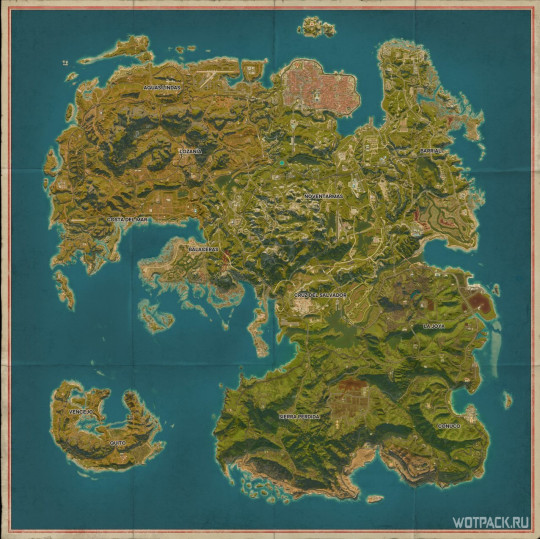
Content has not yet been approved by Yara’s official Office of Tourism. This content has not been approved by the Ministry of Culture and Maria Marquessa can kiss it.
Getting There

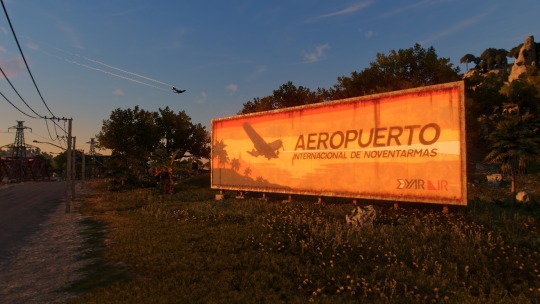
Yara has one International Airport, Aeropuerto Internacional de Noventarmas, located in the Valle de Oro region. There are 2 weekly direct flights to and from Miami, Florida. Flights from Yara to Miami are on Mondays at 7:00 and Fridays at 22:00. Check your local listings.
Note: At this time, due to the current situation, there are no official, legal, chartered ships to and from Yara.
Where to Stay

Yara offers accommodations to fit every budget, from luxurious 4-Star hotel to a damp cot in the jungle.
Hotel Paraíso
If safety and luxury is your thing, Hotel Paraíso will be your accommodation of choice. It is located in the heart of the capital city of Esperanza. Make sure to read the "Things to Know Before Visiting Yara" section for important additional information.

Hotel Paraíso, Esperanza, Yara
Beach Resorts
Being a Caribbean island, Yara is naturally surrounded by beautiful sandy beaches and offers many beach side resorts, particularly on the East coast in Barrial.

What To Do in Yara

Outdoor Playground Made in Heaven
Back to Content Index
Yara is a true playground made in heaven for outdoor enthusiasts! Its varied landscapes offer a plethora of outdoor activities. You can go horseback riding, hike endless jungle or cliffside trails; if you prefer speed, you can rent ATV's and blaze through the jungle or a jetski and explore inland rivers, lakes, and the ocean. You can go hunting, fishing or experience the rush of skydiving and base jumping!

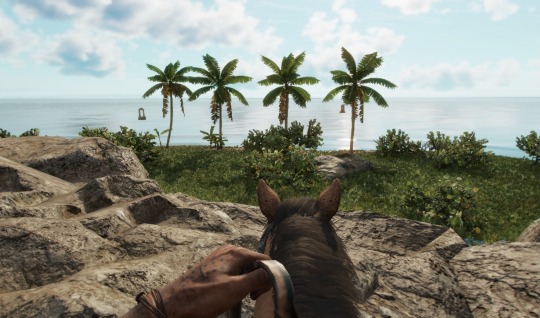


Culture and Architecture
If jumping off a cliff is not really your thing, you may wish to explore Yara's rich history and architecture. It offers many national parks, museums, Churches, there's even a Dino Park!
Stay tuned for future content and information.
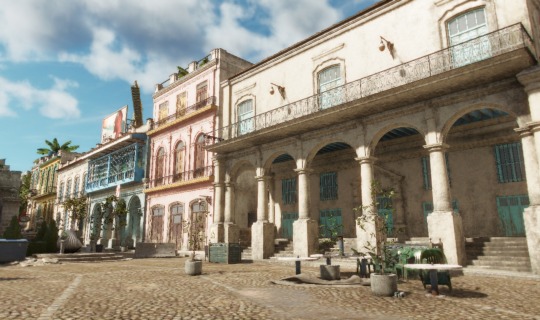
A picturesque street in Esperanza, Yara

Catedral de la Divinidad, Esperanza, Yara
Things to Know Before Visiting Yara
Please read this section carefully for potentially life saving things to know before visiting Yara.
Nighttime Curfews
Due to the current situation, some but not all towns impose a nightly curfew and residents and travelers alike are required to remain indoors between the hours of 8PM to 6AM. In addition to the capital city of Esperanza, towns like Segunda and Concepción are also under curfew. To find out if your city is currently under curfew, pay attention to announcements over the national PA system which will provide information in both Spanish and English.

Carry your Passport and Identification on your person at ALL TIME
Soldados of the Fuerzas Nacionales de Defensa or FND, have the right to demand that anyone produce valid identification at any given time. Just show your papers. It is that simple.
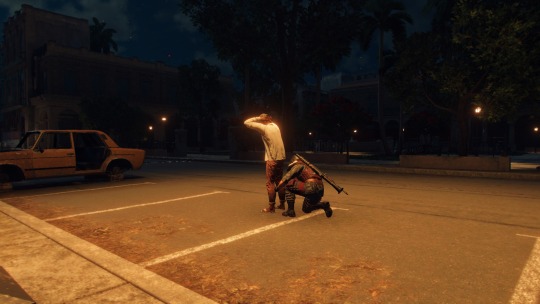

Obey the FND at all times!
Yara is a... ehh.. highly regulated country and is under martial law at this time. As a traveler, it is your duty to obey the rules and regulations at all times to avoid incarceration or--
To avoid incarceration.
Additional rules
There are many rules that may appear strange to foreigners but must be respected to ensure that you remain safe during your stay in Yara.
No public gathering
In light of recent events which resulted in violent protests, public gatherings of 6 people or more are prohibited and will be met with swift action by the FND. If you are traveling in a group, you can obtain a special permit from the Ministry of Culture.
Restricted Areas and Additional temporary entry restrictions
Yara is big on safety and signs. As you travel in Yara, you will encounter many signs prohibiting or restricting access to military sites and government owned and operated facilities. DO NOT TRESPASS IN YARA. Ever. Additionally, you may see areas that are not normally restricted add temporary restrictions at certain times, such as events organized by the Ministry of Culture, public executions, or public appearances by El Presidente de Yara, Antón Castillo.
Restrictions on Tobacco
Smoking of tobacco is not illegal in Yara, however, it is not permitted to possess more than 25 grams, the equivalent of two packs of cigarettes, at any one time.
For more information on activities, places, events, and all things Yara, come back and visit this site often!

A lot more content coming soon!
Back to Content Index
Editor’s Note:
You may be aware that there is another airport in Yara, Aeropuerto Gabriel Castillo De La Joya near Concepción on the very tip of Yara’s east coast, however, it was not mentioned in this section as it is no longer being used for international flights. The airport has been converted to a military airport. A photographer who will remain anonymous for safety reasons may or may not have momentarily trespassed to bring you these few photographs.
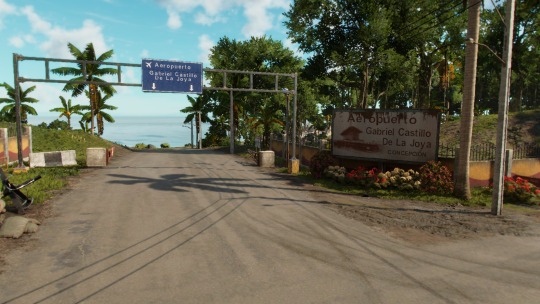

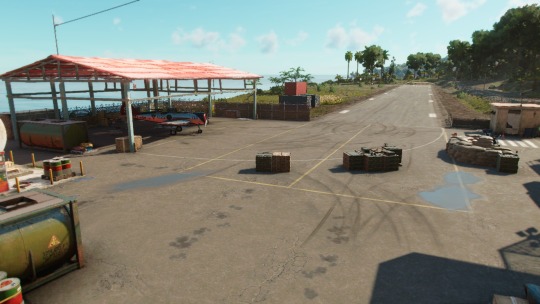
Back to Content Index
42 notes
·
View notes
Text
oh my godddd someone I know has John Fetterman as a rep and sent him that plea to support the SSI bill and the auto-response from Fetterman ends up being about ceasefire demands instead of the social security bill. She didn't ask you about the ceasefire she asked you to support the SSI Recovery Bill you fucking dildo!

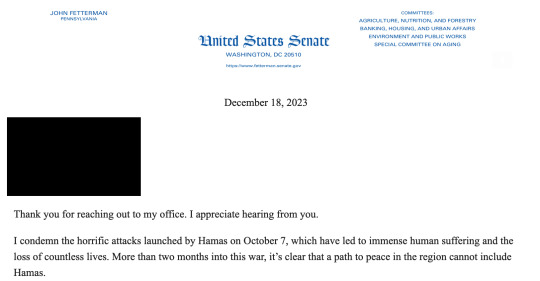
Anyway, clearly he's getting hit with ceasefire demands and assumes incoming mail must be about that, so send him some more.
His email is [email protected]
DC Number: (202) 224-4254
Philly Number: (215) 241-1090
Pittsburgh Number: (412) 803-3501
More Office Addresses and Numbers through Pennsylvania
Fetterman's Full Letter under the cut
Thank you for reaching out to my office. I appreciate hearing from you.
I condemn the horrific attacks launched by Hamas on October 7, which have led to immense human suffering and the loss of countless lives. More than two months into this war, it’s clear that a path to peace in the region cannot include Hamas.
I applaud the tireless work of the Biden Administration and our partners in the region to facilitate temporary ceasefire agreements, which have enabled the release of hostages and the flow of humanitarian aid into Gaza. These agreements were a huge deal, but we know that Hamas is still holding over 130 innocent people. I won’t rest until they all return home safely.
While those temporary ceasefire agreements were a welcome development, I do not believe now is the time for a permanent ceasefire. Hamas has repeatedly broken previous ceasefire agreements, giving us little reason to believe it would abide by the terms of a new one. As its leadership has said itself, Hamas wants to destroy Israel and its people, and it won’t stop until it achieves that goal.
It’s also important to remember that this is a war between Israel and Hamas – not Israel and Palestinians. We know that Hamas’ extremist ideology and its thirst for violence don’t represent the thoughts, feelings, and aspirations of the Palestinian people as a whole. I am devastated by the immense loss of innocent civilian life, and I don’t assign any less value to the lives of Israeli or Palestinian children than I would my own children. I also know that Israel’s responsibility to respond to Hamas’ horrific attacks does not absolve our ally from their moral and legal responsibility to minimize the deaths of innocent Gazans. I remain committed to ensuring that we are getting humanitarian aid to the people of Gaza – and that this aid matches the overwhelming need.
The path to peace is clear: Hamas must release those still being held hostage and surrender. Until then, Israel has a responsibility to address the threat posed by Hamas. As long as Hamas is able to operate in Gaza, Israelis and Palestinians won’t be able to coexist peacefully, with secure and sovereign states of their own.
Here at home, we can’t allow the evils of antisemitism and Islamophobia to take root in our communities. This sort of bigotry is meant to divide us, and we all have a responsibility to call it out when we see it. No matter where you’re from or who you worship, one thing is clear: hate and violent extremism have no place in our commonwealth or our nation.
Please know that I continue to monitor the ongoing conflict closely and will use the tools at my disposal to bring home any Pennsylvanians who remain in the region. My constituent services team is available to help those who are experiencing visa or passport issues during this time and can be reached via email at [email protected]. Additionally, if you need to notify the State Department of a U.S. Citizen who is experiencing an emergency abroad, please call the Department at 202-485-6100 or 202-647-4000 (after hours), or contact the nearest U.S. Embassy or Consulate in that country.
Thank you again for contacting me to share your thoughts. Please do not hesitate to reach out in the future about other issues of importance to you. If I can be of assistance, or if you’d like to learn more about my work on behalf of Pennsylvanians and our commonwealth, I encourage you to visit my website, https://www.fetterman.senate.gov/.
Sincerely,
John Fetterman
United States Senator
#john fetterman#us politics#pennsylvania#took you two weeks to respond to the wrong question AND do it horribly! well done!
8 notes
·
View notes
Video
youtube
COVID rapidly spreads in China as government eases strict quarantine rules, December 27, 2022
China is grappling with the rapid spread of COVID-19 after the government began rolling back its zero-COVID restrictions earlier this month. Now, cases are spiraling across towns and cities, hospitals are overburdened, medical staff are outnumbered and crematoriums are running out of space. Judy Woodruff reports.
PBS NewsHour
There is no nuance left in politics or public health policy when there is either an absolute and strict inflexibility of zero COVID or wholesale dismantling of safeguards before the healthcare or support systems are prepared for the waves that have been forcibly suppressed. The political insistence on using their own less effective, non-mRNA vaccines based on the original strains rather than Delta or Omicron, coupled with a low vaccination rate of the vulnerable and elderly is not helping easing the transition at all.
The way they’ve been counting mortality from COVID diverged from nearly every other country since early 2020. A death had to be directly attributable to SARS-CoV-2 eliminating cases of many preexisting or undiagnosed conditions, chronic illnesses, and other high risk factors that may have been exacerbated by the virus which became listed as the direct cause or if they simply tested negative in the few days before dying. The policy as of this week will further limit the count only to deaths caused by pneumonia or respiratory failure after contracting COVID, in addition to dropping much of the remaining inbound quarantines and regular case counts becoming even more inconsistent with lived reality.
It appears the PRC was prepared to stay in suspended animation within an onionskin of self-isolation layers indefinitely, maintaining the appearance of control and adherence to policy that was left to different local officials to execute. Downgrading the classification removes the local, emergency-style powers to lockdown and quarantine which were used capriciously. Residential buildings, offices and commercial areas such as malls, and even theme parks could be suddenly cordoned without warning, causing panic due to the stringency of testing and knock-on effects if a positive case was found rather than fear of having contacted or contracted the virus. Becoming listed as a close contact or a complete stranger’s positive result could mean further quarantining and repeated testing, as well any change in one’s COVID passport status severely restricting mobility for work or education, travel, or even basic necessities. The protests spread because “dynamic zero” was anything but dynamic, refusing to change or amend course in preparation for a transition to an endemic or post-epidemic state. People were simply fed up and the building momentum was becoming a potential danger to a regime that had just renewed its own political mandates.
These things aren’t happening in isolation, China is also changing tact on its travel restrictions domestically and internationally. The Special Administrative Regions of Hong Kong and Macau have been trying to reopen ports and travel with the Mainland for years now for travel and economic reasons. Both were forced into accepting one-way policies where it was difficult for their citizens to enter China or even between one another, while rules were softened for travelers and politicians entering from and returning to the Mainland for short trips with the reason that the pandemic was less well-contained than within the Mainland.
As news of the highly visible current outbreak within China is continuing to emerge, the Hong Kong SAR is now proudly announcing agreements have been made with the Mainland to drop their travel restrictions posthaste. It’s being reported that many are travelling specifically for mRNA vaccines which are approved in Macau and Hong Kong.
#China#covid 19#coronavirus#pandemic#public health#politics#Chinese Communist Party#Xi Jinping#pbs newshour#seriously#fundamentally ridiculous#bureaucracy#zero covid policy#vaccination#epidemiology#reuters#financial times#news#current events#health care
43 notes
·
View notes
Text
As the war drags on, Russian soldiers are continuing to abduct and torture civilians in Ukraine’s occupied territories. One of these civilians is Leonid Popov, a 22-year-old Melitopol resident diagnosed with schizophrenia. On April 24, 2023, after being detained and tortured by occupation authorities multiple times, Leonid disappeared from his home. After three months of imprisonment and abuse, he was transferred to a hospital ward, where he was treated for emaciation. Then, on August 2, Russian forces told Leonid’s dad that he was being released — but hours later, soldiers abducted him again. Leonid’s mom recently told her son’s story to journalists from the independent outlet iStories. Meduza is sharing an abridged, English-language adaptation of her account.
Occupation
Me and Lenya, my older son, moved to the Poltava region a few years ago, while my sons’ father — my ex-husband — stayed in Melitopol. Two months before the war started, Lenya went to stay with him in Melitopol.
Then, two weeks before the war began, my ex-husband got into a car accident. He was hospitalized for multiple fractures and memory loss. My younger son, who’s one year younger than Leonid, also went to see him. Soon after that, fighting broke out and Melitopol was occupied. My children found themselves under a blockade.
I wasn’t worried about my younger son; he’s more like an older sibling. He was with his father, helping him, driving him to get his bandages changed.
But our Lenya is a Rain Man. Growing up, he was always different. A wunderkind, a musician. He played in the orchestra, did ballroom dancing, and played chess, traveling all across Ukraine for competitions and winning first place. He competed in chemistry, physics, and astronomy competitions, and outside of school, he studied at the Minor Academy of Sciences of Ukraine. He was a walking calculator — you could give him any difficult multiplication or division problem and he’d quickly give the answer.
But he doesn’t understand people’s emotions. He was always asking, “Mom, what does it mean when you look at me like that?” When his symptoms flared up, he might jump, leap, laugh. Small children really love him. But he can also be very serious, like a sage. He’s very kind and always ready to help everyone. But he’s also very naive and succumbs to pressure — it’s easy to exploit him.
I begged him to leave Melitopol from the beginning. There were evacuation routes. But he said, “I’m needed here. I have to help people. There are grandmothers who are hungry, and I give them bread, I give them porridge.”
The first abductions
In May 2022, Ukrainian mobile networks were disconnected in Melitopol. My younger son left to look for phone service during curfew and ended up in a military office. He told me that everyone who had tried to get service, around 30 people, had been thrown into a crowded cell. There was a single bucket for all of them to use as a toilet.
There was one person in the cell who seemed drunk. He was screaming incessantly. The soldiers said, “Cover his mouth, or we’ll shoot you like kittens.” Then the terrified crowd started to beat the person. Whenever he started yelling, they would choke him to make him stop. Eventually, he died.
That was on May 21. On May 28, Lenya, my oldest son, went to buy shawarma, and there were a lot of young people standing in the same area. Soldiers came up to them, threw them all [into a car,] and drove them to a military office. There, they tortured Lenya with electric shocks. Afterwards, they let him go, but took his passport.
After that, Anna’s younger son decided to leave Melitopol. During the “filtration” process in Chonhar, Russian soldiers beat him and threatened to drive him out to the steppe and shoot him. He ultimately managed to get out and is now in Europe.
Leonid disappears
In the spring of 2023, I saw an announcement that there would be free evacuations from Melitopol with help from Western volunteers. Lenya didn’t have a passport [because the occupation authorities had confiscated it]. By then, they had already started issuing Russian passports, and I told him to get a Russian passport. But he refused; after the electric shock torture, he had made up his mind never to get a Russian passport.
Still, I prepared all of his documents and arranged for him to be taken to safety in Poland, where I would pick him up, and at that point, he agreed to leave.
The volunteers were supposed to pick him up on April 26. On April 24, his father called him, asking him to come see him. Lenya said that he was on Pushkin Street, five minutes away by foot. 15 minutes passed, then 20. My ex-husband tried calling Lenya again, but he could no longer reach him.
I asked my ex-husband to drive [to the house where Leonid had been living during the occupation]; maybe he was asleep or sick. My ex-husband broke down the door, but my son wasn’t there.
The search for Leonid
My ex-husband and his partner went to the police and the military commandant’s office. They officials there said they hadn’t detained anyone for about two months. (As it turned out, this wasn’t true; they had detained many people.) The police wouldn’t take a statement. They said, “Don’t worry, he might have been detained by soldiers — we don’t have any authority over them. They’ll just look through his phone. If there’s nothing bad there, they’ll let him go.”
I started to worry that Lenya’s disorder would worsen because of his abduction. This had happened before: in 2017, he became unrecognizable. A psychiatrist in Zaporizhzhia said that he needed to be hospitalized. He was diagnosed with “undifferentiated schizophrenia.” He spent three months in a hospital, where he was treated with antipsychotics. When I picked him up, I had to re-teach him how to brush his teeth and hold a spoon.
Later, another psychiatrist confirmed that he does have an illness but said he hadn’t received the right treatment and that his hospitalization had been unnecessary. She prescribed a new course of antipsychotics, and after that, Lenya went into a long remission.
When he disappeared, I went insane: Is he even alive? What’s happening? I was scared that the stress would cause him to lose his memory and his sense of reality again. The doctor had warned me that regression was possible and that he could regress to the level of a 10-year-old child.
I put the information on social media and wherever else I could. Ukrainian journalists contacted me; I did an interview and a story came out. But I hid the fact that Lenya had a mental illness. I thought I would lose his trust completely if he found out his mom spoke like that about him to the whole country.
I don’t know whether Russian forces saw these stories or if it was a coincidence, but after the story came out, someone called Lenya’s dad. He introduced himself as a military policeman and offered to meet. He said he was participating in the search for Leonid and asked a bunch of questions about me and his father.
The man put my ex-husband in touch with another police officer, a soldier who introduced himself as Lev. “Don’t worry,” he said when I called him, “We’ll search for him. We’ll let you know as soon as we find him. You need to be calm, your child is fine.” I trusted him. He also said I should stop talking about the abduction publicly so that Lenya would be released sooner.
“Mom, I miss you’
In June, Lenya’s father received a call from someone who said that he was being held in a military office basement with our son. The guy said our son was in critical condition: unable to stand up, exhausted, and constantly whispering, “I want to eat.” He said they were only given water every two or three days. When they were given food, which didn’t happen every day, it was only in very small amounts. He also said they were beaten. If Lenya wasn’t taken out of there, the guy said, he would die.
The men were being held in a military office in an old traffic inspection building. Lenya’s father went there, and a guard came up to him and said no one was being held there. They told everyone that no one’s in there — but in reality they’re holding a lot of people. (Editor’s note: iStories has confirmed that multiple prisoners were held in the building in question.)
I immediately wrote to the soldier, Lev: “Help! My son’s illness is worsening, he can’t starve.” Lev wrote back that Lenya was fine, he was smiling, and he was even making jokes. He offered to pass along a package once a week. Lenya’s father agreed right away. The soldier helped us organize a phone call, and Lenya had a supervised conversation with his dad.
Lev said that Lenya was allegedly being held for taking photos of military equipment.
He sent me a photo of Lenya and a voice message: “Mom, I miss you, I heard your message and started crying. Look, I have emotions now.” He’d had problems with emotions. As soon as I saw my son’s photo and heard his voice, I was eager to go. But the soldier told me, “It’s not worth it. They won’t let him go. You won’t see him, so there’s no point.”
‘They beat me so hard that I couldn’t use the bathroom for four days’
On July 24, Leonid’s father called me and said “Lenya is now going to talk to you.” I was unbelievably happy. But his voice was so weak. He said, “Mom, I’m in the hospital.” And the connection dropped.
Lenya’s father then told me that soldiers had taken him to the gastrointestinal department to be treated for emaciation. He’s 1.95 meters (6’ 5”), but weighed just 40 kilograms (88 pounds). His father took a video and sent it to me. Lenya’s 22 years old, but he was behaving like a child. He didn’t understand anything; he was just repeating, “I want to eat.”
He ended up in a gastrointestinal unit with doctors who hadn’t left [after the start of the occupation]. The gastrointestinal doctor knows me, my deceased mother, and our family. I knew he was in good hands, that they would help him recover. Lenya started to stand up and walk, and he constantly wanted to eat; they would give him two servings at the hospital.
He felt better after getting an IV. He started talking. But he was only able to tell us a small part of what happened to him. He said, “Mom, you know how you said that there’s a hell? Well, I went to hell. I was beaten by soldiers and by my cell mates.” He shared a prison cell with convicts from Simferopol and Sevastopol. He said that he was interrogated at the beginning, that he was beaten constantly by soldiers, and that he was forced to sign some documents, but he couldn’t remember what they said. He was barely fed and only given water once every two to three days.
I wrote to the soldier [Lev]: “My son is emaciated! And you said that everything was okay!” He asked if my son might have some kind of illness. From the very beginning, I had told him that he’s ill and that he’s not supposed to put through stress. But Lev told me again not to worry.
He said, “I fed your son. I brought him sausages and grechka, and I moved him to a good cell.” I don’t know if it’s true. He had lied to me when he told me that my son was happy, well-fed, and doing fine. And I had desperately believed every word I heard.
I told Lenya that there are good people in the world, like Lev, the soldier, since he passed along packages to him and sent photographs of him. “Well, he also beat me during interrogations at the beginning,” he responded. “But whatever you say.”
Lenya said, “I was so scared to fall asleep. I was scared that they would come and choke me again, kill me. I was so thirsty, but they wouldn’t give water. But most of all, I wanted to eat. Then they beat me even harder. They beat me so hard that I couldn’t use the toilet for four days. Why, mom? Ma, maybe you know what my crime is?”
“I’ll never go back there, right?”
On August 2, the local Investigative Committee called Lenya’s dad and told him that Lenya was being released for lack of evidence. His father picked him up from the hospital and drove him back to the house, but they hadn’t even made it to the door when soldiers arrived in a vehicle with tinted windows: Lev and his partner. Lev said that he couldn’t do anything to help, that the case was still open, and that he was facing pressure from his superiors. He handed Lenya a bag to put over his head, and then they taped him up and took him away. A week has passed and Lev still hasn’t answered any of my messages or the calls from Lenya’s dad.
Lenya’s father called the Investigative Committee. They said that they’re sorry but that there’s nothing they can do to help, because they have no power over the military command. They suggested consulting an international organization. I haven’t received any updates about Lenya since then.
The last time I spoke with my son was about an hour before the soldiers took him. He was so happy that he’d soon be free. “Mom,” he said, “I’ll never end up there again, right?” “No, my son,” I told him, “I’ll come to get you.” He asked me to wait so that he could say goodbye to his friends and his girlfriend, who he’d started dating in Melitopol. He told me, “Mom, I kissed someone for the first time. I’m in love.” I told him that we’ll move to Germany where my younger son is, where there’s no war. I said we’ll go to museums and churches there.
He also managed to tell me that there are a lot of people detained at the military office. Most of them are civilians that have been held since the start of the war. Their relatives are searching for them, but they don’t know that they’re there. Some of them have already died, and their relatives don’t even know.
This the 21st century. Our grandparents survived fascism in 1941. Now it has returned, only to another country. Hitler used to exterminate people with mental illness.
The human rights organization Every Human Being is assisting Leonid Popov’s mother. Its employees told iStories that they filed complaints with various agencies in Russia and Ukraine, as well as UN working groups on arbitrary detention. So far, human rights activists have only received confirmation that these complaints have been received.
After the media report about Leonid came out in Ukraine, a man who introduced himself as a military police officer contacted Leonid’s father and offered to meet with him. The man said that Leonid is fine, that he’s being fed, that he’s not being beaten, and that he was allegedly detained for taking photos of military equipment. Journalists from iStories have identified the number as belonging to Igor Kara, a former Ukrainian police inspector from the Donetsk region who defected to the Russian side after the full-scale invasion. On the phone, he initially denied that he knew Leonid Popov before confirming that he spoke with his father. Kara said: “The case of his disappearance is with the Investigative Committee. The Investigation Committee is searching for him.”
The investigator from the Investigative Committee who called Leonid’s father on August 2 and said Leonid could be picked up told iStories that Leonid has been recognized as a victim in his criminal case: “Investigations are underway to establish his whereabouts. He’s not in our custody. Contact the military commandant’s office. We also contacted them. I can’t tell you their response as it’s a classified investigation. I can’t comment on criminal matters in my department.”
7 notes
·
View notes
Text

Unshakable Faith (2023)
Episode 17 Breakdown
He Xiwan is threatened by Lai Guangrun, and a woman comes into the barn to offer her some food but she refuses to speak to either of them. The woman leaves the barn, telling Lai Guangrun that kidnapping a high profile expert is reckless and he gives the order and the electrician Liu Simao boards up the door to the barn.
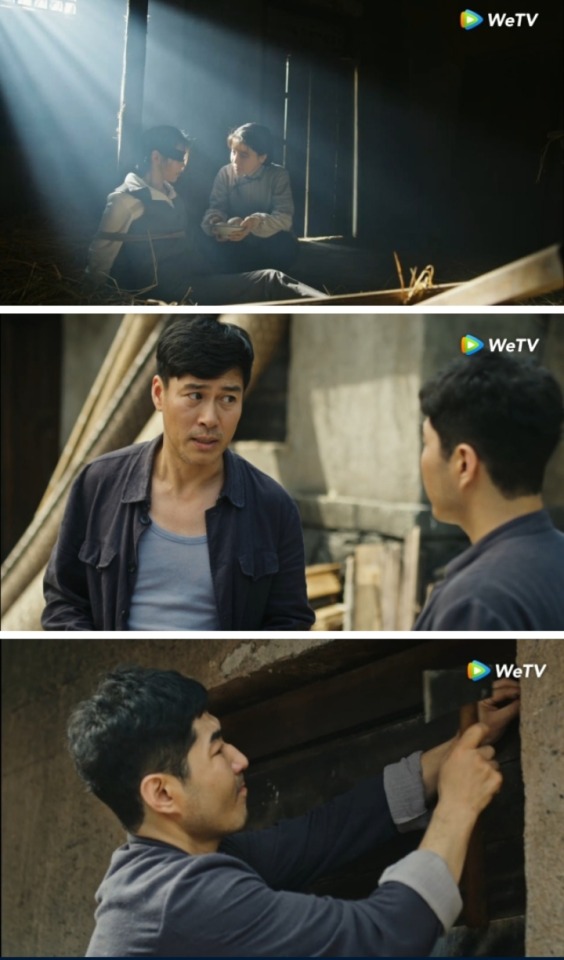
The lion clock leads the police team to the story of an old prestigious local family, whose farms are now abandoned. Shortly after this they get another call from Zhou Jun arranging an exchange at the river on the opposite side of the region. Knowing it's a diversion but stalling for time, Police Captain Chen and Officer Tongbin go to the river and find only a note stating to give up the Water Drop project or more experts will die. Officer Hongmei and Officer Ding reach the abandoned farm and find the boarded up shed, breaking their way in when they hear He Xiwan calling for help.


The art exhibition is held and Officer Jiang interviews several of the attendees about Zhou Jun and his style is recognised by one professor, bringing their list of suspects down to one teacher.
Officer Hongmei and Nurse Bai take Ji Danyang in his wheelchair to see the progress at the construction site and he is greeted by Master Welder Niu and many of the other tradesmen. In his excitement about the work Ji Danyang even gets out of his chair and Officer Hongmei teases him about being on his feet.

Ji Danyang is allowed back to his dorm and settles right into the problem of the pool construction, explaining how the concrete needs to be poured all in one process to have adequate pressure stability for their future testing.
The night before the pool construction, Officer Hongmei is tasked with searching Security Captain Li's room while he is on a job, but he's suspicious and comes home early while she's still there. Avoiding being found, Officer Hongmei completes her search and finds the letters and photos of Security Captain Li's sweetheart - who turns out to be the same woman who tried to intercept Ji Danyang in Hong Kong. The Police team are now certain that Security Captain Li was behind several sabotage attempts in the past but he must also have an accomplice that is still unidentified.
Officer Hongmei tracks Security Captain Li to a meeting with a messenger and watches them exchange bags. Her team arrests the messenger and she follows Security Captain Li through the evening market crowd, but he evades her by cutting a power line and escapes in the dark.

.......................................
Good for He Xiwan to use her teeth and not trust anyone until Hongmei arrived! I was thinking that they gave up rather quickly about trying to get He Xiwan to talk, but clearly this was a diversion so that they could try and sneak their way into the construction site. These KMT spies are really good at layering their diversion tactics, keeping our good guys on their toes.
It's great to see our math man healthy and happy again and it seems like he's got a lot of friends not just with the women at the factory but the construction crew as well. And he's back to giving Hongmei grief - she has to physically restrain him when he decides to try and run. Dorks.

As Hongmei was following Security Captain Li through the crowd I was seriously expecting someone to suddenly stab or shoot him, and the bag he'd been given to have junk paper instead of the money and passports he was wanting. The KMT have already said to Dr Bai that you can't walk away from your actions, and I'd doubt they'd want Security Captain Li out of their grasp when he can identify Lai Guangrun as Lizard and the plans for the pool sabotage. I imagine he's probably scared of that too, but we'll have to wait and see if he survives long enough to be caught and confess.
It's really interesting how some of the spies are really sympathetically written and some are very black and white villainous, Dr Bai and Security Captain Li being the former and Zhang A Shui and Lai Guangrun being the latter. The sympathy for Dr Bai was developed before the reveal of his past and him being roped back into the spy game in the present, whereas Security Captain Li's treachery reveal was early on and the sympathy has been developed the more we see him being coerced.
And I felt sympathy for Lai Guangrun and the electrician Liu Simao before their spy reveals but none after, and I wonder if the longer the time to know the characters before their reveal will mean a bigger feeling of betrayal for me as a viewer. I know that the influx of new workers likely means there will be a few new spies coming into the factory, but we also know that Snow Wolf is somewhere nearby and unrevealed, and logically will likely be a character we already know well.

2 notes
·
View notes
Photo

The only thing an A&R man needs, Seymour Stein once said, was a good pair of ears. Stein, who has died aged 80, might have added indefatigable enthusiasm, a streak of opportunism and a shrewd business brain, all of which he deployed in a career that saw him sign the deals that launched the careers of Madonna, the Ramones, Talking Heads, kd lang and many others.
Those artists enjoyed their first hits on Sire Records, the label Stein co-founded in 1966 and with which he remained synonymous even after his company had been absorbed by the Warner Music group. By the time he stood down in 2018, unhappy with corporate politicking, Stein’s achievements had long since earned him a place among the finest “record men” – as they were known – of his generation.
“I have no easily definable skills or talents. I’m a hit man, a record business entrepreneur,” he wrote in the introduction to his autobiography, Siren Song, in 2018. He played no instrument and had no technical knowledge, for which he was ultimately grateful, believing it might have got in the way of an appreciation of artists who could not be judged by conventional musical standards.
The story of how Stein acquired the US rights to the then-unknown British band Depeche Mode for his label typified his modus operandi, based on instinct and energy. One day in 1980 he picked up the latest issue of a British music paper in his New York office and read about a new group signed by a UK contact, Daniel Miller, to his Mute Records label. On a hunch, he grabbed his passport, booked a ticket to London on Concorde, and went straight from the airport to meet the group in Basildon, Essex, their home town, an hour’s drive east of London. “I signed them on the spot,” he remembered.
Their subsequent success made them one of a string of British bands whose records he released in the US. When his rivals called him an anglophile, it was not always, he recalled, meant as a compliment. But it was British musicians, from the Climax Blues Band to the Smiths, who provided a bedrock for his business.
To sign Madonna Ciccone in 1982, he summoned the singer to his bedside at the hospital where he had undergone heart surgery. Having listened to her demo tape, he offered the 24-year-old $45,000 for three singles with the option to release an album. Going on to sell more than 60m albums in the US alone while helping to reshape feminism for a new generation of young women, she was his greatest success.
He was born in Brooklyn, New York, to Dora (nee Weisberg) and David Steinbigle, Orthodox Jews whose own parents had emigrated from Galicia, the region of eastern Europe straddling Poland and Ukraine. His father was employed in Manhattan’s garment industry while his mother worked at her family’s market in Coney Island.
A heart murmur in infancy kept him away from sports at Lafayette high school, where he discovered that he preferred applying his prodigious memory to Billboard magazine’s charts of current bestselling pop records than to his lessons. The love of music was kindled by listening to the records brought home by his older sister.
During a summer holiday he talked his way into an internship at Billboard’s offices on 47th Street and Broadway. It was there that he met Syd Nathan, the myopic, asthmatic, choleric boss of King Records, the label of James Brown, based in Cincinnati. In 1961 Nathan suggested that he shorten his surname and offered him a job, asking, “Do you want to be a spectator or do you want to be in the game?”
It was at King that Stein learned, from the ground up, how the record business really worked. His knowledge would be expanded while working for George Goldner, another old-time record man, at the Red Bird label, where the Shangri-Las and the Dixie Cups were the hit acts.
There he met the songwriter and producer Richard Gottehrer, with whom he founded Sire, each putting in $10,000. The Climax Blues Band, Barclay James Harvest, Matthews Southern Comfort – all from the UK – were among early successes, along with an album by the Dutch band Focus, before the pair began releasing their own self-recorded albums from 1970.
After Gottehrer had left the label in the mid-1970s, Stein and his wife Linda could be seen patrolling the New York clubs, scouting a new generation of local bands. They were quick to pounce on the Ramones, with their two-minute blasts of brattish attitude, and the cooler art-school rock of Talking Heads. From the UK came Echo and the Bunnymen, Soft Cell, and the Pretenders, whose American singer, Chrissie Hynde, was impressed by Stein’s extraordinary recall of lyrics old and new.
As well as continuing to sign emerging acts – many of them from the UK, such as My Bloody Valentine, Aphex Twin and Everything But the Girl – Stein also played a significant role in the later careers of established stars. Brian Wilson’s eponymous first solo LP was released on Sire in 1988; the following year Lou Reed’s artistic momentum was revived by the first of a series of Sire albums, titled New York.
While on a constant search for new music, Stein used his fortune to eat well and to collect art and antiques, including The Siren by the pre-Raphaelite painter John William Waterhouse, which he sold at Sotheby’s in London in 2018 for a reported $5m. In 1983 he helped found the Rock and Roll Hall of Fame, into which he was inducted in 2005.
He and Linda Adler were married in 1971, shortly after she had recovered from the shock of his announcement that he was gay. Their formidable and often turbulent partnership, which also produced two daughters, was ended by divorce after seven years. Samantha, their elder daughter, died of cancer in 2013. Stein is survived by their younger daughter, Mandy, and by his sister, Ann.
🔔 Seymour Stein (Seymour Steinbigle), music industry executive, born 18 April 1942; died 2 April 2023
Daily inspiration. Discover more photos at http://justforbooks.tumblr.com
16 notes
·
View notes
Text
Olga Kharitidi,
'90-es évek, Novoszibirszk, pszichiátriai intézet.
" Later, as I was completing my paperwork and dreading the long bus trip back to my little apartment, the phone rang in my office. I picked it up and heard "Hello, Olga!” in a voice I recognized immediately as Anna’s. Anna was a medical doctor, and we had been close friends for many years. I had become adept at sensing the many different moods of her complex personality through the sounds and rhythms of her voice. Today she sounded tired and worried.
As usual, for a while we chattered about nothing and everything. Anyone listening to us might have found our conversation trivial, but every time we talked, even about simple things, I rediscovered the importance of our friendship. There was always a phrase, an emotion, or simply a surge of energy between us that left me feeling joyful and alive. I knew it was the same for her.
The main reason for her call today became clear when she asked if I could make time to see her neighbor, who feared he had a serious mental problem. I couldn’t refuse her request, so I asked her to send him to my office the next day at three o’clock. Anna had never visited me at the hospital, so I gave her directions and I marked the appointment in my calendar. We made a date to see each other soon and then said our good-byes.
The next day, at exactly three PM., the day nurse brought a young man to my office. He stood hesitantly in my doorway.
“How do you do, doctor. I am Nicolai. Your friend, Anna Anatolievna, referred me to you.”
Nicolai was a young Siberian with a handsome Mongolian face. With age, faces such as his were often dominated by a hard masculine strength. This man was still young enough to show hints of shyness and sensitivity, both of which were particularly apparent at the moment. He was clearly embarrassed and ill at ease to be standing in a psychiatrist’s office.
Apart from his nervousness, the young Siberian standing in front of me certainly didn’t look mentally ill. Still, I guessed he must have felt he was in serious trouble to have taken Anna into his confidence and then to have come here of his own free will. In my professional experience, I had discovered that very few people were willing to seek psychiatric help on their own. There was a tremendous stigma attached to any hint of mental abnormality. This not only dissuaded people from getting help but also led those who did so to try every means possible to keep it secret. If their situation became known by their friends or colleagues, it inevitably created social discrimination.
Nicolai moved forward and stood in the middle of my small office, still looking awkward and unsure of himself. I told him to make himself comfortable, gesturing him to the chair in front of my desk. I watched him as he went to it and sat down. He looked like a factory worker. He wore a neat dark gray suit, white shirt, and black tie. I could tell he perceived our meeting as a very official event. He sat nervously on the edge of the chair. I didn’t hurry him but simply waited for him to tell his story. After a short silence to collect his thoughts, he began.
“Thank you for seeing me. The reason I am here started about a month ago.”
He spoke Russian with a slight mountain accent I found pleasant. Anna had told me he came from Altai, an isolated, ethnically different region with its own language. I was not surprised to hear him give a typically Russian name, for all native peoples were given Russian names when they applied for internal passports from the Soviet state. It was a purposeful evil, intended to hasten the destruction of their cultures by deliberately erasing the heritage that lived in their names.
Nicolai didn’t look at me as he spoke. It was clear that he still felt very embarrassed but that he had made a commitment to himself to talk to me and was determined to fulfill it. Undoubtedly it was difficult for him to open up his mind to a stranger, and he feared my reaction to what he was about to say.
“This thing began for me when my mother asked me to come home to my village in Altai.” The expression on his face showed that he was reluctant to speak about his village. This was common. Many youths who came to work in the city preferred to hide their country origins for fear of being ridiculed. He continued slowly.
“My uncle, Mamoush, had become very sick, and my mother needed me to help nurse him. We were his only relatives, and he had lived alone, apart from the other people of the village. I had never been interested in spending any time with him, but I could not refuse my mother’s request. I had no choice but to take a vacation without pay and go home.
“I spent ten days there. My uncle died on the fifth day. He was eighty four years old, and like most of our people of his age he knew his time had come. He had no interest in trying to live any longer. In our village we believe that anyone of his age has already lived a complete life and would want to die. I had never had much love for my uncle, so I had no desire to change anything unless it was to help him move on quickly so I could return to my life in the city.”
As Nicolai went on, his voice trembled, and he paused longer and longer between sentences. All the while, he continued to emphasize that he had never been close to his uncle. I couldn’t help wondering why he was still so nervous. His sensitive personality wasn’t enough by itself to explain being so affected by the death of an aged relative he had hardly even known. I knew his story didn’t fit together yet, but I didn’t ask questions or interrupt. My job for now was just to listen and let him continue his story in his own way.
Nicolai continued to ramble, telling me how difficult it had been for his mother to take care of his dying uncle and what he, Nicolai, had done to support her. Then he shared some opinions with me about the nature of his uncle’s disease, switching from one possible malady to another. I could see that his fears were getting in the way of his desire to be healed and that he was trying to find the courage to tell me the real essence of his story.
I finally decided to interrupt him, in an attempt to bring him back to the reason he had come here. “Nicolai, you suggested that whatever it was that you wanted to talk to me about began about a month ago?”
He agreed without either speaking or looking at me, simply nodding his head up and down.
“What happened after your uncle’s death?”
“Well, it is a strange story. . . .”
“I have heard many strange stories. What is so strange about yours?”
“Do you believe in shamans?” he asked tentatively.
Now it suddenly struck me that perhaps I, not he, might be the one in trouble. I knew almost nothing at all about shamanism. The word shaman had a very negative meaning in our society, as an unhealthy symbol of primitive cultural and spiritual beliefs. I had to be very careful with my answer.
“Unfortunately, I know only that shamanism had to do with the old religion of the Siberian peoples, long before Christianity. That is all I know. But I believe in the existence of people called shamans.”
Gradually, still without looking at me, he seemed to understand that I was accepting his words without judging them. His body relaxed into a softer posture, and his voice sounded less nervous.
“My uncle was a shaman,” he continued. “Because of that, I did not like to spend time with him. He lived in solitude on the edge of the village. Many who lived there believed he had very strong shamanic powers, but nobody was sure he used these powers only for the proper things. And maybe they were right. People were afraid of him, and they avoided him except when they needed his help for their problems and diseases.
"I never was interested in such things myself. From the time I was very young, my only wish was to leave him, and even my village, as soon as I could. You know there is nothing to do in the country, especially in the winter. It is cold and boring. I never doubted that I would go to the city right after I graduated from high school. I wanted to serve in the army but didn’t pass the medical examination. My vision is terrible. So, you might understand how happy I was to find my present job. I have been working here for almost a year now, and I have already been promised an apartment for next year. It is rare to have this happen so soon. For now, of course, I still live in a dormitory.”
I knew that as soon as young men and women got jobs at a plant, their names would be put on a waiting list to get their own apartments. Sometimes it could take up to twenty years for a name to come to the top of the list. Occasionally a name might even get lost, and the happy reward of a private place to live might never happen at all. These unfortunate people would live out their working lives in dormitories where three or four people shared a single small room. Sometimes as many as fifteen or twenty rooms would share one small kitchen area, one shower, and one toilet. I understood how much it would mean to Nicolai to be promised an apartment so soon.
Nicolai continued, “I have a girlfriend, and we are planning to get married. So, you could say that my life’s dreams have started to come true. Now I am afraid everything may be lost. I really need your help, doctor. I am ready to do anything, to take any medicines to restore my health. To restore my sanity.”
He looked at me with a desperate hope I rarely saw in my patients. It was still difficult for me to piece his story together. His shamanic uncle had died, and now he feared he was mentally ill. His problem was not yet clear to me. I tried to postpone a conclusion of some kind of psychosis, even if what I had heard so far of his story tempted me toward such a conclusion.
Hesitatingly, he resumed talking. “I fell sick the day after my uncles death. While he was dying, he had asked me to spend time with him alone. I was not happy about this at all, but I agreed because it was his last request. He lived in a small dark house without electricity. He had a collection of very strange things there: half-dead plants, stones (some with pictures on them), his drum, tattered clothes. Everything in his small house was unusual. I was frightened, yet I felt I had no choice but to spend his last days alone with him.
“Then my uncle began to speak to me about power — shamanic power. The first time, he talked more than two hours about it. I was not attentive. It sounded to me as if he was having some sort of dying fantasy, so I simply tried to be polite to him. We had many other conversations. I don’t remember much except the very last one.
“It happened late one night. His illness had grown worse and worse, but he hadn’t let me invite anyone else to be with us. His breathing became rapid and heavy. His speech became interrupted, and he seemed confused. I knew his end was near. Finally, he asked me to come close to his bed. The room was dark. Only the corner where his high, narrow wooden bed was placed was dimly lit by the flame of a single candle, burning on a small table amidst strange amulets and dried herbs.
“My uncle lay covered by a warm blanket made from multicolored scraps of different fabrics. When I drew near, he grasped my hand roughly in his own hot dry hands. From somewhere, his voice suddenly found great strength and clarity. He stared at me intensely. His whole being had changed so dramatically that for a moment I actually thought he had rid himself of his disease.
“Slowly and with great concentration, as if he might have been trying to hypnotize me, he said, ‘Shamanic powers live with us in this world, and they must be left in this world. I am dying, and my power won’t follow where I am going. I give it to you, because this is what has been decided by the spirits.’
“As he spoke I experienced a severe cramp in the hand he was so desperately holding. It felt as though a fire flashed through my body. I was too stunned for a moment even to notice that in that same instant my uncle had died. My state of mind was completely strange to me. I could not, and still cannot, fully describe what happened. I understand that this might be necessary for you to diagnose what’s wrong with me, but I don’t know what else to say. I tried to throw light on my problem by reading some books about psychiatry, but I had to give them up. It was much too difficult for me to understand the words.”
He had almost been reliving his experience as he described it. His left hand had seemed to cramp when he talked about it. His face was now sweating, as if he had heard his dead uncle’s voice again while talking to me.
“Let’s take a little break from talking about your uncle. Maybe you can tell me a little more of your life in the city?”
He accepted my suggestion with obvious relief. “What would you like me to tell you?” He shrugged his shoulders indecisively.
“Tell me about your work, the workers at your plant. How do they relate to you?”
“Well. Very well.”
I looked at him silently. He was motionless, sitting very straight on the edge of his chair. His posture showed a great deal of tension.
“They are good people, but they are very different from the people in my home village.”
“What are the differences?”
“Well, it’s difficult to say. I’ve never really thought about it. I’ve just felt it. They drink a lot, even at work. My people also like vodka, but they would never be as rude after a few drinks, or even after many drinks.”
I imagined this sensitive young man among his coarser fellow plant workers. Well, at least part of his dream of moving to the city hadn’t been as lovely as he had expected.
“Are you trying to be like them?”
“No, I don’t think so. I realize that I have to get used to being here, though. It was my wish to live in a big city, but I expected a lot more from it. I guess I still believe it can be a lot more. I only need to get used to being here. And I need to be healthy.”
After a brief pause, which seemed to help him collect his strength, Nicolai continued.
“After my uncle's death I had a very high fever for five days. I did not eat, I did not speak. I did not even remember who I was. In my delirium I saw him all the time. Thanks to a local district doctor, who came to see me and gave me some injections, I recovered from the fever. I forgot everything that had come to me in my sickness, and although I still felt very weak, I returned to work.
“Then I got better and better physically, but at the same time something began happening to my mind. I started to hear my uncle’s voice demanding that I remember my dreams. Now his voice comes to me without warning, anytime, anywhere. It comes when I am speaking with people, and when I am on the bus among strangers. I become deeply frightened when this happens, and I know I must seem crazy. I feel panic and want to run away. It is becoming so bad, I am afraid I may be fired from my job.” After a long, deep sigh, he asked if he might smoke.
Normally I would not let a patient smoke in my office. In Nicolai’s case, I decided to break the rule. I felt it would help him be comfortable and open up. He took a pack of cigarettes without filters from his suit pocket and frantically looked for his matches, his hands moving quickly from pocket to pocket without finding them.
I stood up and went to the corner of the room opposite my desk. From the top of the refrigerator I took the matches and the tea saucer that occasionally substituted as an ashtray and handed them to him.
The small hinged opening at the top of my window was too high for me to reach, so before going back to my desk, I used a long pine stick to open it a little bit. The stick had a carved human head at one end. It had been made for me a few years earlier by an elderly patient who for twenty years had believed he was God and who had tried incessantly to create people from wood. The man had died the year before, old and alone like so many of our patients. There were no relatives to bury him, so the hospital sent his body to the medical school to be used for studying anatomy.
I remembered that when I began medical school, one of the hardest things for me emotionally was having to dissect the old, thin, often decrepit corpses. Eventually, I had no choice but to relate to them as tools for science, trying to forget that they had once been people who had lived the ends of their lives alone, with no one to care for them or give them comfort at the moment they died. Even at the medical school, where they became objects in the name of science, their lifeless bodies were denied respect.
Freezing cold air burst in through the windows narrow opening and swirled through my office. Nicolai moved his chair away from my desk and smoked with deep inhalations.
“What am I going to do with this man?” I wondered. I knew I had all the resources I needed to begin an effective psychiatric strategy to diagnose and treat him. If Nicolai had been an official, legally admitted patient, I would have been more or less required to order a series of laboratory tests that would tell me if he suffered from the aftereffects of some unknown fever, manifested through a residual organic psychosis, with possible episodes of seizure. But in this case I could be more flexible, so I decided to try something different first. I would do what I felt was correct for Nicolai. Depending on the outcome, I could always use a more traditional psychiatric therapy later.
I asked him if he was willing to try an experiment. He nodded his head in agreement, and I asked, “Do you think you could hear your uncle’s voice again, in my presence?”
He inhaled deeply again, and it was obvious that the cigarette had made him more comfortable. "I think I can, but I don’t know how to make it happen. It always comes by itself, without my willing it."
“Perhaps we can do it together.”
“I agree to try.”
I pushed the hidden button on the floor near my desk, signaling for the nurse to come into my office. The button had been put there originally for emergencies with violent patients, but we usually used it as a form of communication between different stations in the hospital.
When the nurse arrived, I asked her to walk Nicolai to the hypnotary, the room where we carried out hypnosis, and to wait for me there. He put out his cigarette, stood up, and took his short black sheepskin coat from the nurse.
I watched them from the window as they walked through the snow to the hypnotary. They were talking to each other, and I wondered what about. The nurse was a professional. She had retired a few months ago but then had decided to return to work to help support her three daughters. It was common for parents to help support their children even after they started working at their own jobs. This nurse, who was both conscientious and frugal, managed to buy new clothes for her daughters almost every two months. It sometimes cost more than half her salary to do this, yet she did it willingly. I was glad she was back.
I had just finished filling out and signing ward papers and was about to go to the hypnotary when the doctor on duty called me from the reception ward. “Olga,” he said, “I am admitting a very serious patient to your women’s ward. She has been coming here periodically for twenty years. The diagnosis is schizophrenia. She was last admitted to our clinic two years ago. Now she is in the last degrees of cachexia [physical exhaustion]. It appears she hasn’t really eaten in more than a month because of the voices that fill her mind. I’ll prepare all the prescription orders for the nurses tonight, but I'd really like you to see her and her husband before you leave today.”
“When will she be at the ward?” I asked.
“In an hour and a half,” he replied.
I agreed to see her and was relieved that I would still have time to work with Nicolai first.
Our doctors had put a lot of their own efforts into creating the hypnotary. It had already been built when I began working at the hospital, and it was a miracle that it existed at all. Over and over again, I had heard the stories of the dedicated doctors who had made legends of themselves by supplying the equipment, supplies, furniture, and carpeting to create this important facility. It could never have been done through government channels. The hypnotary was crucial to my work, and I always felt comfortable there.
I entered the darkened room quietly, the plush carpet allowing me to move with soundless steps. A small red lamp sat on the floor in each corner of the room. The room’s silence and the faint red glow of the lamps helped me make the necessary mental and emotional trip beyond the sounds and images of the world outside.
The nurse had already prepared Nicolai. He was reclining in a soft, deep armchair in the middle of the room, wearing only his white shirt and pants. His suit jacket, tie, and boots had been taken to another room by the nurse, who would have them waiting for him at the end of the session. He looked relaxed and did not even notice my arrival. I quietly walked over to him and slowly let the back of the armchair down.
“We can start now, Nicolai. I need you to answer my questions honestly and as accurately as possible. If you don’t have an answer, don’t try to think one up. Our success does not depend on the number of questions you answer. It depends on a different quality. And we don’t have to discuss what that is but only trust it, knowing that it is already present and true for us and that we may be guided by it.” My words were deliberately obscure, because I needed to confuse his mind in order to create an opening for my words to enter his unconscious.
Nicolai closed his eyes, and his facial muscles became more relaxed as I consciously spoke to him in a deeper and deeper voice, speaking more slowly and quietly with each word.
“Now I am going to ask your body a question that doesn’t require your answer, Nicolai. You don’t even have to listen. I need to get an agreement from your body that it will help protect you from stress during our work. Now I’m speaking directly to your body, asking it to cooperate with us in protecting you. And I'm waiting for an answer.” His left hand gave a small tremor, and I knew from my experience that it was a sign of agreement.
“Thank you,” I responded in acknowledgment.
I continued, “Nicolai, in the past there have been many times when I have tried to recall an important memory but found it impossible to do so. The more I focused, the more unavailable my memory became. I tried again and again, until I became absolutely exhausted. Then I gave up and relaxed. Shortly thereafter, the image I sought came to me from my unconscious. This phenomenon was what first led me to understand the power of the unconscious mind and to realize that it can help us immensely if we learn how to communicate with it.
“As I speak to you now, you may not understand some of the things I talk about. Don’t be concerned. It is not necessary for your conscious mind to know the meaning of my words, so don't interrupt the calm and relaxed state that is expanding inside your mind and body by trying to understand them. Your unconscious will know. I want to enlist the support of that power that has been speaking to you in order to teach you something important. This may not make sense to you yet, but my intention is to help you understand."
“Do you remember the last time you heard your uncle’s voice? Please answer yes by moving your left hand or no by moving the right one. Was it on Monday?”
Nicolai’s right hand moved slightly. “Tuesday?” No. “Wednesday?. . ."
When I reached Friday, the left hand moved.
“Place yourself where it happened. Is it dark where you are?”
No.
“You are in a well-lighted place. I think this is your workplace. You are speaking with a colleague.” Carefully observing the response from his hand, I continued as it made little movements of agreement. “The time now is just before your uncle speaks. You can remain calm and relaxed, because we are in charge of this experience and nothing had can happen.
“You are at the point in your memory where you can hear the voice of your uncle. No one from your work notices anything. The colleagues you were talking to go away, dissolve. Your attention shifts from them to your uncle’s voice.”
Nicolai’s face became tense. He breathed more deeply and quickly. I reached forward and placed my hand on the middle of his chest, saying, “Now my hand breathes together with your lungs, and we can bring this rhythm down, slowly and calmly — gradually, together.”
He calmed down, and said softly, almost in a whisper, “I hear him. . . .”
“Listen to everything his voice tells you. Be calm and sure. My hand is here with your breath, and you can get help from me or stop any time you want. But you won’t need to stop, for you are protected and safe.”
Nicolai spoke softly, “He is not frightening me now. He is different from before."
“Stop talking to me, Nicolai. You did not come here to speak. You came to listen. So do it now. I appreciate your sharing with me, but not right now. We will do that later. For now, just try to remember everything your uncle says, and he open to it."
I stood over him in the reclined armchair for half an hour, my hand on his chest. It was fairly dark in the room, but I could see his face. It was relaxed, and at first it looked as though he was sleeping. Gradually, as he began to relive his memory, his expression became more active. His eyes began to move quickly under their closed lids. He was obviously seeing intense images. All the emotions he was experiencing were reflected in his face. I saw him wondering, expressing curiosity at first, then deep sadness, and I thought he might start crying. I sensed he was very far away experiencing something important in his memory. I guided his breathing with my hand, slowing him down, prepared to wake him up if his emotional state appeared dangerous. Otherwise, I would let him return on his own when he was done.
Finally, he took a long, very deep breath and announced, “I have completed my journey. I am ready to come back now.”
His voice sounded stronger and more sure of itself. I spoke to him again.“Now I ask you to be attentive to my words, Nicolai. Gradually you will recall how we first met this afternoon, when you came to the hospital. You probably feel very different now, because you have a new memory inside you. When you return from your journey and come back to my office, you will notice these changes. Then you will remember what happened to you, and you will tell me about it. When I take my hand off your chest, you will open your eyes and be present here again.”
I noticed his left hand was tightly squeezing the armrest, and I touched it softly to help him relax. I walked to the wall, turned on the overhead light, and pressed the button to call in the nurse. The red lamps turned off automatically.
I could now see the paintings that had been donated to the hospital by the Siberian Gallery of Fine Art. It was always a small miracle to me that such fine paintings had found their way to this unlikely place. There were some beautiful landscapes on the walls, but the most special painting to me was an oil portrait of a young woman with hair parted in the middle who was wearing rich, lace-trimmed clothes from some past century. She had a kind, reassuring face, and when I worked there, I felt almost as if she supported me.
The nurse helped Nicolai stand up and put his jacket back on. I threw my fur coat over my shoulders and began the walk back to my office. I was quite satisfied with the session. It had gone very well, and it felt right to have tried to resolve Nicolai’s inner conflict without pharmacology. I hoped the experience would prove to be what he needed to settle this family relationship that had appeared to him in such a mythological-religious form.
Nicolai entered my office looking serious and somehow different. Part of his transformation was that now he seemed completely relaxed, not even caring how he looked. He held his tie in his hand and sat at ease in the same chair he had occupied so nervously before.
“I want to thank you for your assistance. I was given a very important message. It changed many feelings inside of me.”
I listened attentively, noticing at the same time how my own feeling of self-esteem was growing. I started to think I was a very lucky therapist to hear such words from my patients so often.
“I was glad to help you. I hope it will allow you to live your life more easily and be successful.”
“But everything has changed, doctor. I think that I must become a shaman.”I was stunned. I sat immobile in my chair, trying to keep the same blank expression on my face as I listened to him. But my feeling of self esteem plummeted lower and lower, turning into shame. How could I have let this happen? This man had come to me for help, and instead I had acted unprofessionally and only reinforced his delusions. I had failed him, and I suddenly felt sorry for both of us.
Nicolai began to explain. “I truly communicated with my uncle. There was no sense that he had died. He seemed fully alive, and he spoke to me like a real person. He argued with me, and I found I could not disagree with anything he said. In the end, he persuaded me.
“Somehow, he showed me a complete history of our people in a way that I had never seen before. It became clear to me how difficult it is for my people living in Siberia. I saw how they had lost their religion and power because of the tremendous pressures from the outsiders and evil spirits among us. I saw some of my friends who have taken jobs that required them to become Communists. I saw how their souls had left them, and how they had become tools of evil.
“I journeyed again and again with my people from winter to winter, without hope, without joy, frightened all the time. They were even afraid to pray quietly to their ancestors and protectors, because they could be sent to prison if anyone even guessed they were doing it. Doctor, this vision you enabled me to see has opened up something inside me that has always been closed off. Now it is accessible.
“My uncle left me no choice. He told me I really have to become a shaman. If I don’t do this, my sickness will increase terribly. He says I’m the only one who can do this, and that my people’s time of lost faith will end. It is toward this goal that I am to work for them. I still don’t know what to think about it. I know nothing about being a shaman! But at the same time I feel it is my true way of life. I will need time to understand exactly what I am going to do.”
It was strange that I didn’t fear his words, for they were very dangerous. In a time only recently past, we could both have been put in prison for them. Even now, with the declaration of perestroika and new thinking, the wrong person hearing his words could still cause much trouble for us.
But I was not afraid. I found that I related to many of the things he was talking about. I didn’t know much about the suppression of native peoples, but I knew what it meant to have to hide one’s religious beliefs. I had been secretly baptized in the Russian Orthodox Church by my grandmother in Kursk, and I had often been confronted with my inability to express my strong attraction for the teachings of Jesus Christ. My daily life did not offer the possibility of going to church or communicating with holy people. Owning religious or esoteric literature of any kind, including the Bible, was forbidden. If found, such books would threaten the security of one’s home in a moment.
As I felt Nicolai’s strong feelings, they changed my own. I no longer cared to evaluate my therapeutic abilities in the context of Nicolai’s treatment. I felt that something important had happened, and what I wanted most was to understand it.
Nicolai interrupted my thoughts, saying, “I was asked by my uncle to give you a message.”
The idea seemed so crazy to me that I did not respond.
“Mamoush said to me, "Tell this woman that very soon she will meet the Spirit of Death. Tell her not to be frightened.’”
I didn’t like these words at all. I had never appreciated predictions of the future, especially dire ones like this. I stared at Nicolai’s clothing. His shirt was unbuttoned at the top, and he lacked a tie. It helped me to remember that he was not an oracle but only a factory worker who was the friend of a friend.
My experience told me our session was essentially over, and I also remembered that the newly admitted woman still needed my attention. I decided to wrap up my meeting with Nicolai quickly. “I don't know anything about a message from your uncle, Nicolai, but I want to wish you success in whatever you choose to do. I believe you have the ability to make all the correct choices, but if you need additional help, please feel free to call upon me. Right now, though, I have to see an emergency patient who has just been admitted.”
Nicolai also seemed ready to finish. “That’s fine, doctor,” he replied. ”I appreciate your time and your help. Perhaps we will meet again. Good-bye for now.”
As soon as he left my office, I quickly crossed the small room to stop the frigid air still pouring in through the open window. For a few quiet moments, I stood and looked down at the grounds below. My session with Nicolai had been unusual and would require time to understand and integrate into my experience. I watched Nicolai as he walked through the hospital grounds toward the bus station. His quick and decisive steps were those of a man certain of his purpose. I closed the window using the same stick with the human head carved by 'God'.” "
Olga Kharitidi - Entering the Circle, 1996
3 notes
·
View notes
Text
DISCLAIMER: im not from the SWANA (south/west asia and north africa) region myself, but i saw this thread by little66bird on twitter (link to archived version) that was quite informative regarding SWANA character designs and making sure they don’t come off as orientalist! so i wanted to share for anyone who might be interested (with their permission)
below is the information, copied verbatim from the tweets (some tweets left out for length):
“A thread about what makes the character look Oriental and what doesn’t for anyone who wants to make an swana oc or story!! It will focus on mixing of desi and arab culture and how to differentiate between them!!
The most thing that people confused with is the headwear please don’t mix desi with arab headwear I didn’t put all types of swana headwear I just put here the ones that people may get confused by them
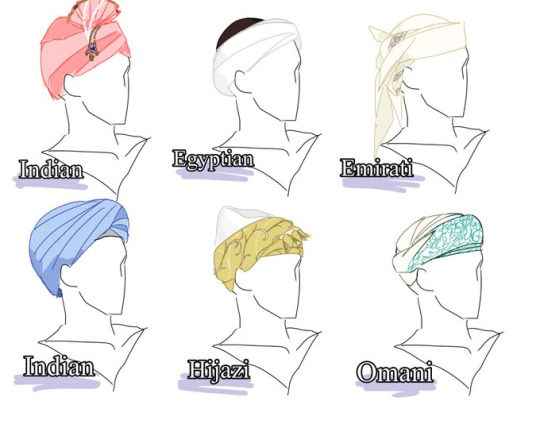
There is a lot of types of desi headwear and in general desi headwear are usually very colorful so please be careful Arab headwear aren’t that colorful. You can change some of arab color of headwear in your design but some of them you can’t change or else it will look like a different headwear

Also Jewelry and accessories can make the design look Oriental and we don’t want that please use references from real life don’t make inspiration from an inspiration just take references from real life
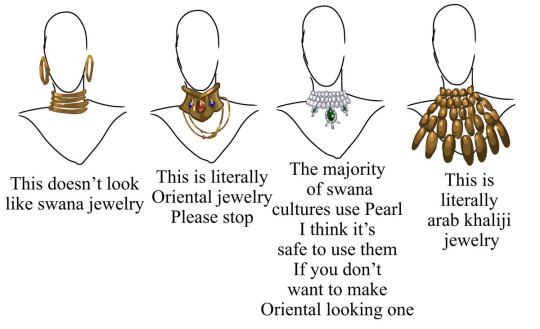
Speaking of jewelry please don’t give your Muslim oc golden jewelry because men aren’t allowed to wear them They can only wear silver jewelry but even tho they don’t wear anything more then rings and watches
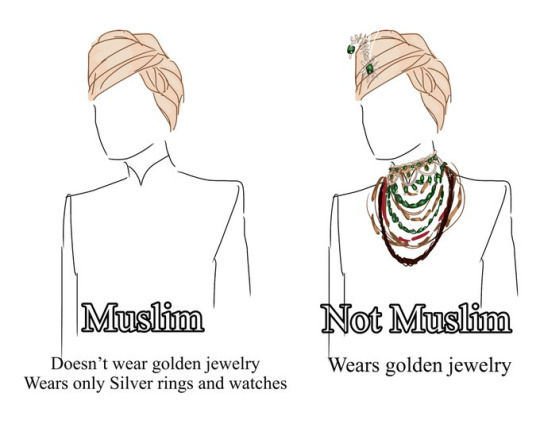
Also Muslims aren’t allowed to have tattoos some of us put fake ones Also not all Arabs are Muslims In the gulf area there is just Muslims arab so it will not make since to make a Kuwaiti Christian oc Instead make an Egyptian Christian oc or any ether county
Also Bedouin women and amazigh women and ether cultures used to have tattoos and usually people can’t tell the difference between arab Bedouin tattoos and amazigh tattoos
Here this may help you with your Bedouin oc if you want to give them tattoos by @siinlayth: [LINK]
Also don’t forget henna it’s something that worth giving your swana oc

henna on the gulf is much simpler than other places and henna styles may different from place to another!!

Styles of hijabs differences from place to place it will be so weird to give your oc an Arab hijab when the oc isn’t arab to begin with
Also if you oc from the gulf you can give them abaya since abaya is very popular there you can go crazy with the designs

If you want to give your oc a veil make sure they are covering their entire body!!

Also I forgot to include men who cover themselves it’s usually because they feel like it or because they are goofy as fuck these type of people like to do pranks I think it’s because when you cover your face you feel more Confident same thing with women who cover themselves

Did you know that Muslim women who wear the niqab like Batman because he’s best Representation for Muslim women they can relate to him because we bother wear the same thing I don’t know how to explain it but when you wear the niqab you feel like your Batman
Why do I keep forgetting things yah also this please know the difference between swana clothes they aren’t the same

Also there is a lot of styles for the shemagh and please draw it like the way it looks like don’t make it look like a mushroom. For those who don’t understand Arabic this pictures Are for Passport Officers they show the styles that you can used for your photo for the job”
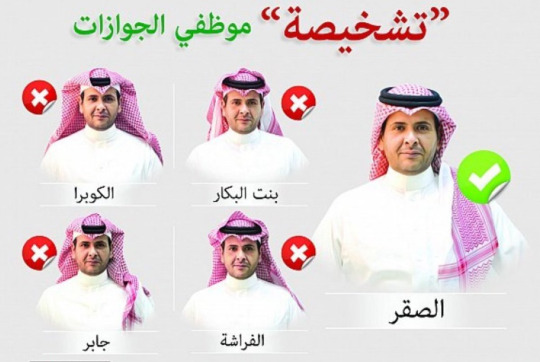
----------
edit (11 sep 2023): added link to archived version of the twitter thread; replaced henna image to be a screenshot of several images
50 notes
·
View notes
Text
First a surrogacy scandal in Greece now in Thailand
This week, Thailand’s Department of Special Investigation (DSI) raiding three surrogacy clinics and arresting a man suspected of working as an agent for a multinational surrogacy ring.
According to DSI assistant spokesman Atsadawut Sripita and Pol Capt Tinnawut Seelapat, director of the Bureau of Foreign Affairs and Transnational Crime, DSI officers raided three places in Bangkok and one in Nong Khai, a region bordering Laos, yesterday.
This was part of an inquiry into a transnational surrogacy operation that is thought to be linked to a case in Bangkok last February when a one-year-old toddler named Thaenthai went missing from the GS Kik nursery. The DSI became engaged after local police discovered that the baby was most likely the victim of a gang operating in the Central and Northeast regions.
Surrogacy Clinics Paid Surrogates
The DSI raided a nursery in Nong Khai’s Phon Phisai district at the time and discovered two babies suspected to have been delivered to paid surrogate moms. Police also discovered a bank book indicating that an agent had hired roughly 20 surrogate mothers, with the ladies receiving 450,000-500,000 baht for each baby they “delivered” for the group.
Since then, police have broadened their probe. Following the issuance of a search warrant, DSI deputy director-general Pol Capt Piya Raksakul led his officers and officials from the Institute of Forensic Medicine and the Department of Health Service Support to raid three clinics in Bangkok on 23 August.
The first raid took place on Ngam Wong Wan Road in Chatuchak district, at a reproductive clinic. Mr. Atsadawut stated that the DSI identified a fertility specialist to work at the facility. He had given compensated surrogate mothers with fertility diagnosis and therapy.
From 2018 to 2020, the doctor accomplished this. Officers also discovered the medical documents of a group of women who had functioned as illegal surrogates, according to Mr Atsadawut.
The second raid took place at a fertility clinic on Phetchaburi Road in Bang Kapi. The same doctor worked there as a part-time physician providing fertility diagnoses.
The most recent raid took place at a fertility clinic on Pathumwan’s Phloenchit Road. According to investigators, the doctor’s transaction records linked him to the clinic’s operations. Furthermore, according to a DSI assistant spokesman, compensated surrogate moms were examined by this clinic before being flown abroad for intracytoplasmic sperm injections.
Police also discovered the surrogate mothers’ and their children’s passports. Mr Atsadawut stated that the facility does not have authority to use or provide medical reproductive technology.
On August 28, authorities from the DSI and Nong Khai Provincial authorities arrested Sunate Chomsri for his alleged involvement. During a search of his home, authorities discovered a list of surrogate mother names purchased and paid for by Mr Sunate, with the intended purchasers believed to be foreigners.
Surrogacy in Thailand
Thailand was a popular surrogacy destination until 2015 because to its low costs and sophisticated medical facilities. Many overseas couples and individuals visited Thailand in search of surrogacy arrangements. However, the Thai government became concerned about potential exploitation and unethical practises in the surrogacy industry, prompting a slew of legislative revisions.
Thailand passed legislation prohibiting commercial surrogacy for foreigners in 2015. International intended parents were no longer permitted to pay Thai surrogates for their services. The law was enacted in response to ethical concerns raised by surrogacy arrangements, including as incidents in which surrogates were reportedly exploited or left with legal and financial vulnerabilities.
Thailand’s surrogacy sector witnessed substantial changes following the ban on commercial surrogacy for foreigners. Many intended parents with ongoing plans experienced uncertainty, and the country’s reputation as a surrogacy destination suffered as a result.
It is crucial to note that surrogacy rules and regulations are subject to quick change, and the information presented here may not reflect the current situation of surrogacy in Thailand. If you are considering surrogacy in Thailand, I recommend checking with legal specialists and current sources to understand the country’s current legal and ethical context.
#thailand#Anti surrogacy sunday#Surrogacy exploits women#International surrogacy exploits poor women#Babies are not commodities#Surrogacy is human trafficking#450000 to 500000 baht is roughly equal to 12730 usd
6 notes
·
View notes
Text

DEVELOPING STORY: Manila Central Post Office explosion halts new ID Applications for both UMID and Postal IDs
MANILA, NATIONAL CAPITAL REGION -- A car battery explosion at the Manila Central Post Office (MCPO) was led to a temporary or indefinite suspension of new ID applications for two widely used identification cards in the Philippines - the Unified Multi-Purpose ID (UMID) and the Philippine Postal ID. The late incident occurred on Sunday (May 21st, 2023 -- Manila local time) causing significant damage to the post office building and disrupting its operations. Several reports by the Bureau of Fire Protection (BFP) indicate that a faulty battery caused the explosion.
In a text message obtained to OneNETnews, the officials of Social Security System (SSS) and Philippine Postal Corporation (PHLPost) releases a disclosed statement: "We would like to inform the public that the new ID applications for both UMID and Postal IDs are temporarily unavailable at the Manila Central Post Office (MCPO) following the car battery explosion incident", the said statement read.
SSS and Government Service Insurance System (GSIS) manage the UMID card, which provides beneficiaries with access to various government services. The program was introduced in 2010, a decade before the CoViD-19 pandemic years to streamline services. National media reports say that the government agencies like the Department of Health (DOH), the Department of Social Welfare and Development (DSWD) and the Philippine Health Insurance Corporation (PhilHealth-IC) accepts UMID cards.
The Postal ID however, is a convenient alternative to a primary ID that is both convenient and affordable. It is accepted by the Philippine government and private institutions for various purposes such as proof of identity as E-Wallets and banking, transaction verification and eligibility for discounts on certain products and services. Applicants who were planning to obtain neither the UMID, Postal ID or both are advised to temporarily seek alternative options while repairs and investigations are ongoing at the affected national post office. Residents can explore other government-issued identification cards such as the Driver's License, Passport or the Voter's ID to fulfill their identification requirements.
Officials from PHLPost have yet to announce an estimated date for when new ID applications for UMID and Postal IDs will resume sooner at the MCPO. It is recommended that individuals to stay updated through official announcements from the aforesaid government mailing company regarding the availability of the services affected by the incident. Post office facilities should prioritize safety measures to prevent such incidents from occurring again. BFP investigators are currently investigating the cause of the explosion and addressing any potential negligence or lapses in safety protocols.
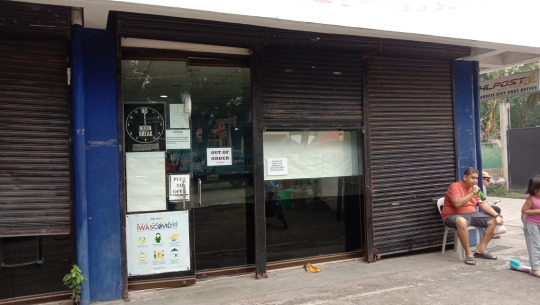
(via Rhayniel Saldasal Calimpong / Freelance Photojournalist of OneNETnews)
Here in Dumaguete alone, new ID applications of UMID confirms that the contract was expired indefinitely with no potential date of resumption on SSS. While the PHLPost branch office in Santa Catalina Street completely goes out of order, leaving no applicants were applied and to pay a one-time fee either the Regular or Rush applicants.
As authorities work towards restoring normal operations in 2024 or later and ensuring the safety of postal facilities, the public is urged to remain patient and cooperative with the necessary adjustments implemented during this temporary or indefinite suspension of ID application services for both UMID and Postal IDs.
FILE PHOTO COURTESY: DZKB-TV 9's CNN Philippines: Manila
BACKGROUND PROVIDED BY: Tegna
SOURCE:
*https://www.rappler.com/nation/car-battery-explosion-caused-manila-central-post-office-fire-bfp/ [Referenced News Article via Rappler]
*https://www.facebook.com/100070122185864/posts/556609080019827 [Referenced FB Captioned Post via PHLPost]
*https://techpilipinas.com/umid-card/
*https://techpilipinas.com/postal-id-requirements-application-process/
*https://en.wikipedia.org/wiki/Unified_Multi-Purpose_ID
and
*https://en.wikipedia.org/wiki/PhilPost_Postal_ID
-- OneNETnews Team
*UPDATED with Photo Representation for a government service disruption (as of July 29th, 2023).
#local news#national news#manila#national capital region#ncr#dumaguete#negros oriental#government#UMID#Postal ID#identification#awareness#OneNETnews
2 notes
·
View notes
Text
An Israeli researcher who went missing in Iraq in March is being held captive by a Shia militia, says Israeli Prime Minister Benjamin Netanyahu's office.
Elizabeth Tsurkov, a PhD student at Princeton University, was conducting research in Baghdad when she was kidnapped.
"We hold Iraq responsible for her safety and well-being," Mr Netanyahu's office said.
Ms Tsurkov is being held by Kataib Hezbollah, according to Israel.
It did not specify what the group's demands were.
Kataib Hezbollah (Brigades of the Party of God) is a powerful Iraqi Shia militia that gets financial and military support from Iran. The US has designated the group as a terrorist organisation since 2009.
Israel said the matter was being handled by "relevant parties... out of concern" for Ms Tsurkov's "security and well-being".
Iraq and Israel do not share diplomatic relations. Last year, Iraq's parliament passed a law that criminalises any attempt to normalise ties with Israel, which it has never recognised.
Ms Tsurkov's family said in a statement that they hold "the Iraqi government as directly responsible for her safety", the Washington Post reported.
Ms Tsurkov, who is an Israeli-Russian citizen, entered Iraq on her Russian passport, Mr Netanyahu's office said.
The New Lines Institute for Strategy and Policy, a Washington-based think tank where Ms Tsurkov is a fellow, said she last contacted them in March and that they later learnt from sources of her kidnap by a "pro-Iranian militia".
"Our first instinct was to shout about her disappearance on the internet, in the media and on these pages," the institute said in a statement in New Lines Magazine, adding that it decided not to do so because of her family's wishes and in the hope of a quick resolution.
According to Ms Tsurkov's website, her research focuses on the Levant - a historical term that refers to a large geographical region including present-day Israel, Syria and other areas - and "the Syrian uprising and civil war".
New Lines said Ms Tsurkov's situation was complicated by that fact that she was "an outspoken critic" of the three countries that may be involved in negotiations for her release: Israel, Iran and Russia.
"All of us feel that the United States needs to be involved in some way in helping [Ms Tsurkov]," it said, pointing to her involvement with New Lines and Princeton.
The US, Russia, Iran and Iraq have not officially commented yet.
The BBC has emailed Princeton for comment.
3 notes
·
View notes
Text
KUALA LUMPUR: The tiny and sombre young woman in the red long-sleeved blouse – one of only two she had with her – hung back while her three towering male friends laughed boisterously and talked animatedly outside a restaurant in the border town of Mae Sot, Thailand.
The group of young adults – their ages ranging from 19 to 25 – had reason to be joyful. A few days before on Feb 3, they were rescued from KK Garden, located on the Myanmar side of the Myanmar-Thai border. KK Garden’s giant compound has been making the news lately as the base for several scamming centres where hundreds of trafficked Malaysians were reportedly forced to work as online scammers.
Nur Fitriani Abdullah, more commonly known as Fi, remained largely quiet throughout dinner, answering questions posed to her politely but did not volunteer any extra information. It took several meetings before she finally warmed up enough to smile and talk.
Coming from a broken home, the 19-year-old told Bernama she was used to being on her own. The diminutive Batu Pahat native has been forced to support herself since her grandfather, who had been her guardian, passed away over a year ago. His death also forced her to drop out of school without sitting for her Sijil Pelajaran Malaysia examination.
So when she saw a Facebook advertisement looking for Malaysians to work in housekeeping at a hotel in Singapore for US$1,100 (RM4,923), it seemed like an answer to her prayers.
“(Because of) Singapore and the big salary, I thought okay, I can try doing this job. I decided to go on my own. If okay, then I would ask my boyfriend to join me,” she said.
Instead, her 25-year-old boyfriend Kamil Abdul Hamid decided to come along. Without a passport, she and Kamil were smuggled into Thailand across the Golok River and then the Moei River that runs between Myanmar and Thailand in mid-September 2022.
Her tale largely echoes that of others from Malaysia and other countries who ended up in Cambodia, Laos or Myanmar after answering fraudulent job advertisements or love appeals online.
While job or love scams and the trafficking of people falling for them are not a new problem, the methods used and locations of the victims and victimisers have changed with the times. With the advent of social media and digital technology and Covid-19 pandemic restrictions creating more desperate people, job scams and trafficking have become worse.
And experts say there is little sign of this illicit activity stopping, making the masterminds rich with little risk and leaving many victims traumatised and in worse straits.
What’s changed
Malaysia is one of several transit points for human trafficking in Southeast Asia. Where Malaysia used to be a country of destination for trafficked migrant workers and asylum-seekers, it is now becoming a country of origin for trafficking.
The Regional Office for Asia and the Pacific at the International Organisation for Migration (IOM) spokesman Itayi Viriri told Bernama that job scams and trafficking of victims have changed beyond the usual established recruitment methods and corridors.
“The kind of numbers we are seeing now and the diversity of the nationalities of the victims, that is completely unprecedented. In fact, we don’t think we have seen that kind of trafficking set up ever before. We think that also says something about the way social networks and online media can be used,” he told Bernama in an email.
Cambodia and Laos used to be the favourite spots for these syndicates but they seem to be losing their lustre in favour of Myanmar. News reports have pegged the troubled ASEAN state, which is suffering from lawlessness and civil strife following the military coup in 2021 and decades-old separatist movements, as the new favourite.
The profiles of victims have also changed. Where syndicates used to target poor and low-skilled workers for the fishery and agriculture industries, now they are recruiting those with some education, Internet-savviness and some skills in English and/or Chinese.
“The way that they choose countries to traffic (victims), it isn’t based on the Asian region, it’s based on English education. It’s English education and Chinese language. They want Chinese translation and English (writers) to run online scams. Malaysians have strong English compared to other countries like Thailand, which has none,” said Judah Tana, founder and international executive officer of Mae Sot-based charity Global Advance Projects.
The US State Department, non-governmental organisations and other experts claim many of the crime syndicates and organised crime elements are from or involve people associated with China. Their middle management tends to be from the same countries as the victims, which means there are Malaysians working willingly as supervisors.
Experts also say the Internet and transnational nature of the offence have made it harder to curb and bring scammers to justice, though not impossible.
Modus operandi
Trafficking people who fall for the job and love scams follow a certain script, according to victims, activists and rescuers. It usually starts with a fraudulent job offer overseas that over-promises or an invitation to chat online with a pretty and receptive girl.
Once hooked, the victim meets up with the recruiter/scammer either locally and is smuggled across the border or receives money or a plane ticket to fly into a transit country. In this case, it is Thailand.
Often, the promised job is elsewhere. Victims only find out the destination has changed after they have embarked on their journey.
Once in Thailand, someone from the company meets the victims and confiscates their passports. Along the journey to the company site, guards keep a close watch on the victims, changing cars and guards every few hours. Security becomes tighter.
The chance to run away diminishes with every step of the way. Victims have reported wanting to escape but were too scared or did not know how and from whom to seek help.
When they reach their final destination – KK Garden in Myawaddy for Fi and friends – they receive their job description, which is to scam people online. If they want to leave, their new “employers” tell them they have to pay the syndicate back the recruitment fees (believed to be RM10,000 per head) and transportation costs.
Fi was devastated when she found out she had been tricked.
“I was thinking, why didn’t they just tell us straight from the start, right? I really regret coming here. Because we know the work is illegal, we don’t want to do the job. But when they threatened me, I thought I would have to work or else I would not be able to leave,” she said.
The syndicate told her and Kamil they had to pay the company RM60,000 each. Her friends, Adam Iskandar Tukiman and Nur Akmar Hamsan, were told they owed the company RM40,000 each.
Their supervisor gave them targets to satisfy. Depending on how successful they were at scamming people, they got perks and cash. If they failed, they got punished with physical exercise.
Anyone who fought back would get beaten, tortured or locked in the isolation chamber. Other threats include being sold off for organ harvesting and thrown into Moei River, which is supposedly inhabited by crocodiles.
Fi said their supervisor would threaten to rape her to keep Kamil in line and to torture Kamil to keep her in line. The threats worked.
Experts say this is forced labour and debt bondage, manipulating and forcing victims to work to pay for the debt they supposedly accrued and for their freedom. The more successful they are, the shorter their stay is. Sometimes, victims turn victimisers as they become successful at scamming and receive lucrative rewards from the company.
Tana, who said he has helped rescue almost 100 trafficked victims, told Bernama the way the syndicates work on victims is almost like a brainwashing programme.
“You can’t say that (brainwashing) has not happened to them in some way, shape or form. That they decided it was okay and they can manage to stay there,” he said.
Aftermath
Fi, Kamil, Adam and Nur Akmar were rescued on Feb 3. Armed with information from Teruntum assemblyman Sim Chon Siang, a contingent from the Thai Army went into Myawaddy looking for them. Bangkok-based Malaysian businessman Victor Wong provided information on a fifth victim Lee Zhi Chong, who was also rescued.
Over a month later, Fi still feels guilt for falling for the scam, for agreeing to take Kamil along and for scamming people for money to save herself. Now, she tells people to be very careful when seeking riches overseas.
She and Kamil are no longer together. She told Bernama via WhatsApp that some of his family members blamed her for him getting trafficked.
“But I’m not hurt because it was my mistake in the first place even though I did not ask him to come along and he decided to come with me. But it’s okay, what happened happened. We need to move on and live our lives,” she said.
2 notes
·
View notes
Text
Thank you for whoever prayed and well wished for a safe trip.
My experiences on this travel: 1. My cellphone was lost after I discovered when my seatmate was looking for her QR code which was part of Immigration requirements. We were almost landing so I asked the help of the stewardess, then another stewardes came, helped too, we were all crawling the area were I sat including my seatmate and her area, it was a pandemonium since everybody was looking for my cellphone inside the plane and announcing the lost of my cellphone, I cannot enter the immigration if I don’t have the QR code. I have the printed one but it was inside my checked in luggage, all i have was on my cellphone’s photo. As I was worrying I felt hardness on my left part of the ribs, I was thinking was this the steel they inserted in my broken ribs, but I felt it was moving, I was scared and I checked it, OMG it was cellphone! I notified the stewardess and she was so happy, she said; I almost had a heart attacked looking for your cellphone, I told her I do too! She was teasing me that I was saying while I was looking for your cellphone Oh Lord, pls help me look up my QR code, it was not the cellphone that I was looking for it was my QR code. She laughed together with my seatmate and other stewardess and people who heard them. I really don’t know how my cellphone went under my sweater and it was on my left chest were broken ribs were…
2.
I almost lost my passport since I forgot my purse at my seat at the plane… Grace remember my body bag that you almost needed a resuscitation looking for it in your car…Mel together with Ate Janet were also looking for it at their house.
I cannot find it again, i learned it only when I was on my way to the immigration. Though I prepared it together with the documents I filled out when the stewardess gave me before landing of the plane. Again, I was anxious and jittery… I prayed hard since I was stranded at a hallway before the immigration counter.
Everyone was looking at me while they passed by me and Joel ( wheelchair guy) was baffled what to do… then when one of the stewardess was walking and saw me… she said the purse that you left on the seat is now at the ground counter claim for lost and found. Joel went to that area and asked for it but unluckily it was brought to their airport PAL office. Suddenly a ground steward came to Joel and said is this the one, it’s the only purse left here. It was the one! I felt my heart collapsed with joy since if I can’t find it I will be detained in Manila .
3. While boarding, my small luggage was intercepted since it doesn’t have the orange colored round label that they placed when you checked in, they said that my luggage can’t be placed on the overhead, the things inside were 2 laptops, chocolates, slippers, shoes, and toiletries. I was bringing all of it in my backpack. Reminder, if you have a hand carry-roller bag, pls. ask the checked in counter to place the orange round label so it will not be intercepted at boarding area. The luggage is now called intercepted luggage and part of your checked in.
4. At my brother’s house: While eating together with my sister in law, I felt I was shaking and dizzy, I thought I have a blood pressure attack. My sister in law had the same feeling and all if a sudden their helper run and shouting linog, linog… linog is lindol… we prayed and it stopped.
There’s a human news that there will be a coming earthquake that is higher than intensity 7 … pls help me pray 🙏 that it will not happen since we have the tallest volcano in the Phillipines, if there is an earthquake with a higher intensity there is a possibility that it erupt and will dissolve the Philippines and nearby asian countries from the map.
Here is a prayer that is being passed on here in Mindanao:
Pray for Mindanao
PHIVOLCS Regional Director said in an interview over a local radio station that it is possible for CDO or Tagoloan to be the epicenter of a high-magnitude quake because of the active fault line in CDO and Tagoloan river. A 7.2 magnitude quake could trigger a tsunami that could reach a 15-storey building. He advised to study our surroundings for a possible evacuation route. He further said they could never predict an earthquake. Preparedness is the key. #repostA huge warning to all Mindanaos. THE 6.3 tulunan earthquake is the start of our journey. We still have more earthquakes to encounter but the most dangerous one is the 8.0 earthquake. These 5 major fault lines at the Philippines. Mati, davao, tulunan, sarangani and zamboanga fault lines can generate up to 8 Magnitude Earthquakes and Thousands of Aftershocks. Please be ready at all costs it was been proven by Digos veteran seismologists. Ready your cellular phones for emergency purposes and First Aid kits.
- NDRRMC
Pls we ask for your fervent prayers 🙏for our nation to spare us from disasters & calamities. In Jesus name Amen
RD OCHOTORENA
OCD - IX
Palihug intawon ug pasa aron daghan ta mag-ampo.
Thank you 🙏
4 notes
·
View notes